CHRO Trends 2025 Report
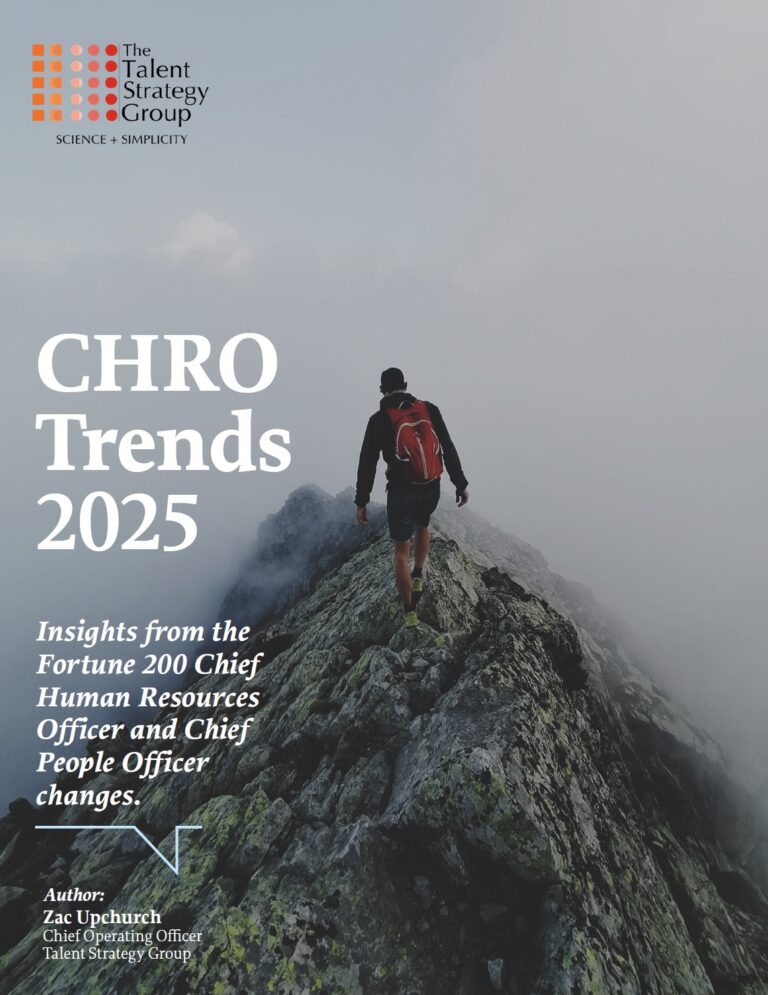
By Zac Upchurch, Chief Operating Officer, Talent Strategy Group
Welcome to the eighth edition of this Chief Human Resources Officer (CHRO) and Chief People Officer (CPO) Trends Report, providing a view into the evolving landscape of Human Resources leadership across the Fortune 200 companies. This year’s report identifies seven key trends shaping the role and introduces the newly appointed 2024 Fortune 200 CHROs and CPOs.
Key Findings Include:
- CHRO/CPO Turnover Rises Sharply: In 2024, 30 new CHROs/CPOs were appointed – representing a 15.5% turnover rate and a 36% increase in turnover year over year. Collectively, these 30 leaders oversee more than 2 million employees and $1.5 trillion in annual revenue.
- Internal Succession Declines: Only 53% of 2024 appointees were promoted from within, down from 73% in 2023 – marking a 27% decline in internal CHRO/CPO succession.
- Female Appointments Hit Record High: Female CHROs/CPOs represented 80% of new appointments, the highest proportion since the report’s 2017 inception.
- CEO Transitions Drive CHRO/CPO Change: When a CEO transition occurred, CHRO/CPO turnover followed in 52% of cases – tripling the likelihood of HR leadership change within 12 months.
I wish to thank the report contributors, and I look forward to working with these Chief Human Resources Officers and Chief People Officers to advance the field of Human Resources in 2025 and beyond.
Trend #1: CHRO/CPO Turnover increases 36%

Turnover among Fortune 200 Chief Human Resources Officers (CHROs) and Chief People Officers (CPOs) rose significantly in 2024, with 30 companies appointing new heads of Human Resources (HR) – representing an annual turnover rate of 15.5%.
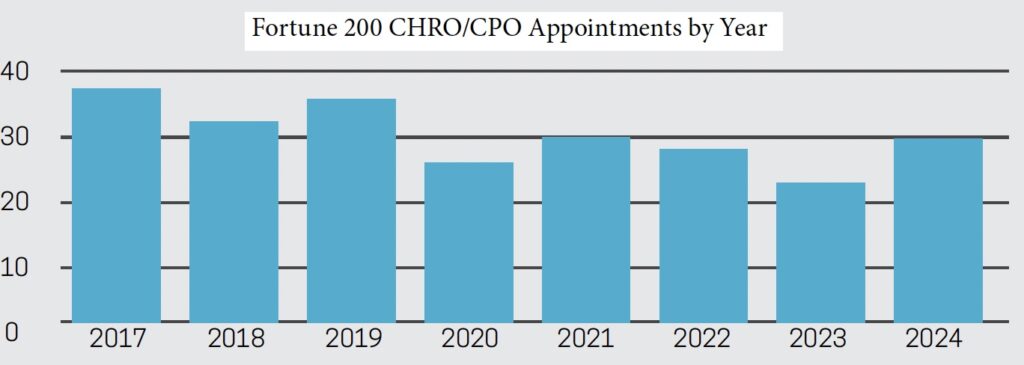
After a steady decline since 2021, CHRO/CPO turnover rebounded sharply in 2024 – rising 36% year over year. That momentum has continued into 2025, with at least 22 new CHRO/CPO appointments in the first half of the year alone.
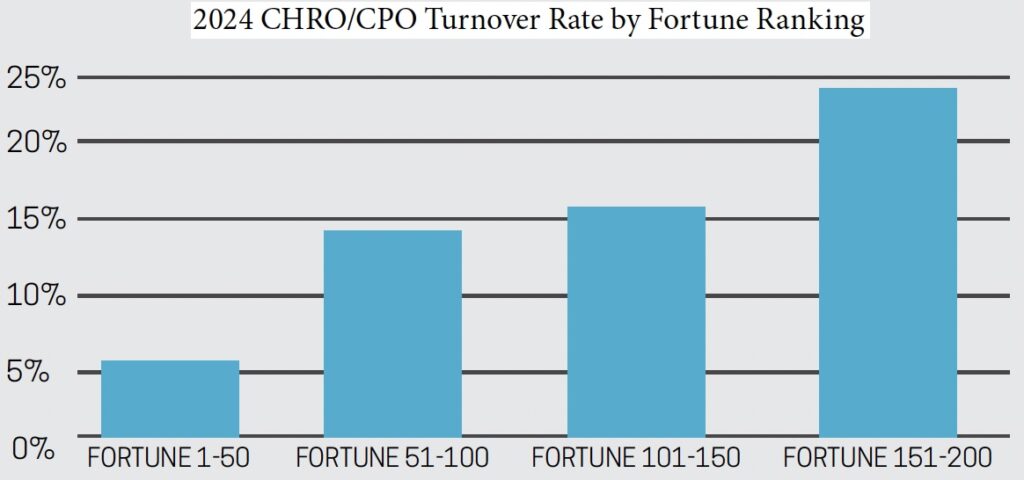
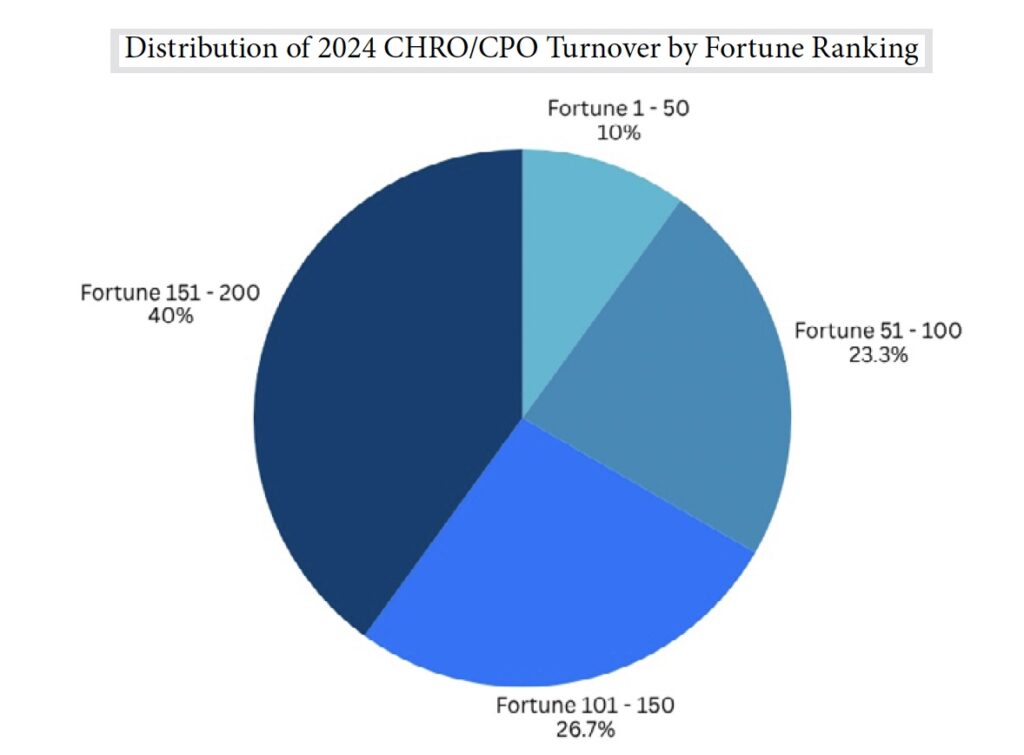
Turnover was most significant among Fortune 151-200 companies, which saw a 24% CHRO/CPO turnover rate – accounting for 40% of all Fortune 200 HR leadership changes in 2024. In contrast, Fortune 1-50 companies experienced the greatest stability, with just a 6% turnover rate, representing only 10% of total 2024 transitions.
Trend #2: Internal CHRO/CPO Succession Declines 27%

In 2024, 53% of CHRO/CPO appointments were internal successions. Of the external hires, 79% had prior CHRO/CPO experience – highlighting the premium placed on proven CHRO/CPO leadership when hiring externally. Among sitting CHROs/CPOs who transitioned to new companies, 82% moved to organizations ranked higher in the Fortune 200, indicating a strong preference for upward mobility in CHRO/CPO career moves.

The internal succession rate for CHRO/CPO roles dropped to 53% in 2024 – a sharp decline from 73% in 2023 – marking a reversal of the upward trend in internal appointments seen since 2021.

The 53% internal succession rate in 2024 also falls below the historical average of 58% since this report’s 2017 inception – and below the overall share of sitting Fortune 200 CHROs/CPOs who were internally promoted.
Trend #3: Female CHRO/CPO Appointments Increase 25%

Female representation in the CHRO/CPO role continues to dominate, with females accounting for 80% of all 2024 appointments – the highest annual rate since this report began in 2017. Overall, 69% of sitting Fortune 200 CHROs/CPOs are female, a figure that has remained largely consistent in recent years.
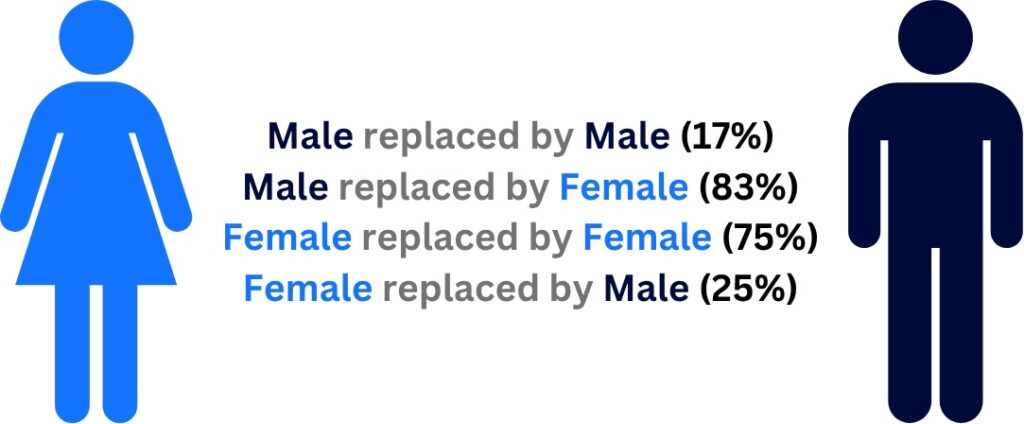
The 80% female appointment rate in 2024 reflects a continued shift toward selecting females for the CHRO/CPO role – regardless of predecessor gender. When the outgoing CHRO/CPO in 2024 was male, 83% of successors were female; when the predecessor was female, 75% of successors were also female.
Trend #4: HR and Business Experience Prior to CHRO/CPO Appointment Mostly Unchanged

In 2024, 93% of newly appointed CHROs/CPOs had prior experience in Human Resources – a slight increase from 91% in 2023. Among the few without HR backgrounds, all were internal successors transitioning from Legal roles. Across the broader Fortune 200, 90% of sitting CHROs/CPOs held HR experience prior to their appointment, reinforcing the function’s preference for domain expertise in the top HR role.

In contrast, experience outside of HR is less critical for reaching the CHRO/CPO role. Among 2024 appointees, 47% had held roles outside the HR function – closely aligned with the broader Fortune 200 figure of 46%. Of those with experience outside of HR, 93% held substantive mid- to late-career roles spanning Legal, Finance, or General Management with P&L responsibility.

The Human Resources Business Partner (HRBP) path remains the most common route to the CHRO/CPO role. In 2024, for every two CHRO/CPO appointments coming from HRBP roles, one came from a COE background such as Talent Management, HR Strategy, or Total Rewards.
Trend #5: CEO Turnover Increases CHRO/CPO Turnover by Over 3x

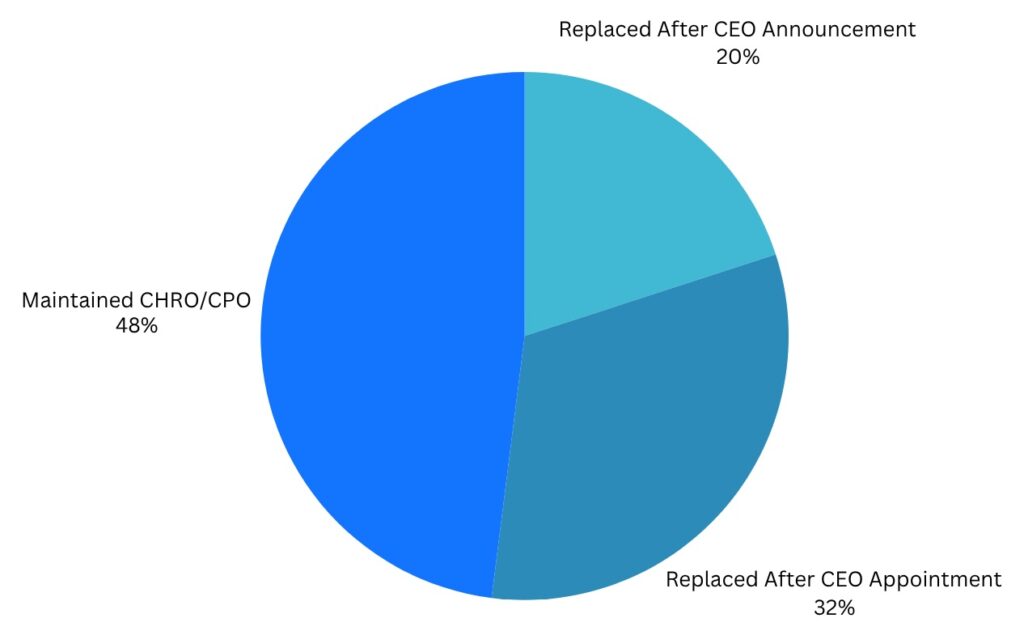
CHRO/CPO turnover typically closely tracks CEO transitions. Within 12 months of a CEO change, 52% of CHROs/CPOs turn over – more likely to exit than to remain. Among 2024 Fortune 200 CEO appointments, 20% replaced their CHRO/CPO after their promotion was announced but before officially taking the role, and another 32% changed their CHRO/CPO within their first year. Only 48% of CHROs/CPOs remain in role beyond 12 months of a CEO transition, making CHRO/CPO turnover more than three times higher than typical annual rates during periods of CEO change.
Trend #6: CHRO/CPO Transitions Occur in Mostly Underperforming Companies

Most 2024 CHRO/CPO appointments occurred amid periods of company underperformance. Among the 27 publicly traded companies with a CHRO/CPO transition in 2024, 41% saw stock price declines in 2023, while another 48% posted gains that lagged the S&P 500’s 23.1% increase. Only 11% of companies outperformed the S&P 500 benchmark in 2023. The trend becomes starker over a longer time horizon. From the start of 2023 to the beginning of 2025, 48% of these companies experienced stock price declines, and just 7.4% outpaced the S&P 500’s 53.2% gain – suggesting CHRO/CPO transitions often coincide with broader company performance challenges.
Trend #7: CHROs/CPOs are Highly Educated but Not Very Global
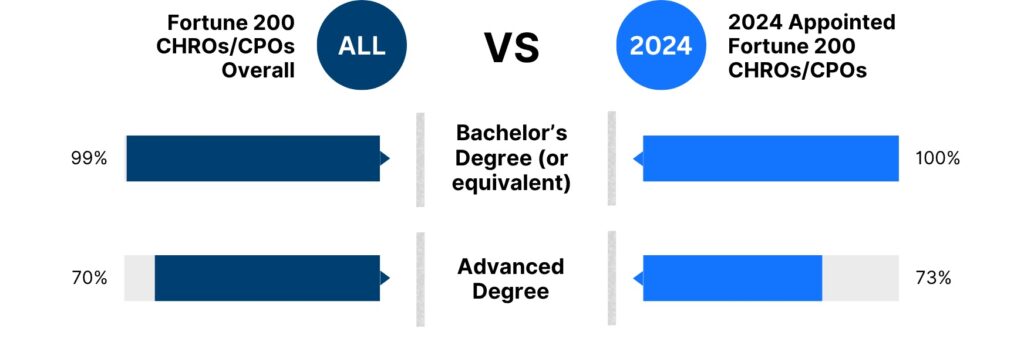
All CHROs/CPOs appointed in 2024 hold undergraduate degrees with Psychology, Political Science, and Economics emerging as the most common fields of study. This mirrors the broader Fortune 200 where 99% of CHROs/CPOs hold undergraduate degrees. Additionally, 73% of 2024 appointees have at least one advanced degree, closely mirroring the 70% rate across all Fortune 200 CHROs/CPOs.

Global experience among 2024 CHRO/CPO appointees declined to 23%, down from 38% in 2023. When a CHRO/CPO has global experience, the nature of that experience varied significantly – ranging from short-term, early-career rotations to extensive, multi-country assignments. Notable examples of globally diverse appointees include:
- Muzzamil Khider Ahmed, Chief People and Culture Officer at Baker Hughes, with experience in the United States, United Arab Emirates, Colombia, Ecuador, and Egypt.
- Joji Sekhon Gill, Chief Human Resources Officer at Applied Materials, with experience in the United States, Singapore, India, and various regions in Europe.
About the Research
This report was produced by analyzing the Fortune 200 companies (based on the 2024 Fortune ranking) and publicly available information for Chief Human Resources Officers and Chief People Officers. We additionally spoke with many CHROs and CPOs, investor relations of respective companies, and the CHROs/CPOs teams to validate data where publicly available information was not sufficient.
In total, 193 of the Fortune 200 companies had an identifiable CHRO or CPO in 2024. The trends highlight those 193 companies. Some companies, for example Berkshire Hathaway, do not have a sitting Chief Human Resources Officer or Chief People Officer. In those situations, the company was excluded from this report’s analysis.
About the Author
Zac Upchurch leads The Talent Strategy Group, an HR and Talent Management consulting firm. He frequently consults with the Boards and Executive Teams of the world’s most advanced organizations on Human Resources and Talent Management with a focus on the intersection of people and organizations, and enabling the full potential of both.
Zac graduated Summa Cum Laude from Arizona State University with a Bachelor’s of Science in Economics. He can be reached at zac@talentstrategygroup.com.
About the Talent Strategy Group
The Talent Strategy Groups helps the world’s highest performing organizations transform Human Resources and their ability to grow talent. Our advisory services include HR strategy, organization design, HR leader assessment, and HR process design. We partner with private equity firms on deal generation, due diligence, and value creation plans from a talent focus. Our education and development services are based at our Talent Management Institute, which is the world’s most popular executive education program on talent. We teach executives and HR leaders how to build better talent, faster through our public and private programs. We advise public and private companies, NGOs, and public sector organizations across geographies and industries. More information is available at www.talentstrategygroup.com.